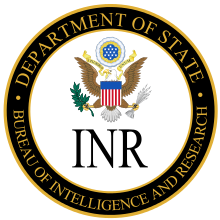Office of Intelligence Research

Seal of the United States Department of State, Bureau of Intelligence and Research
|
|
| Bureau overview | |
|---|---|
| Formed | October 1, 1945 |
| Preceding agencies |
|
| Jurisdiction | Executive branch of the United States |
| Employees | 313 |
| Annual budget | $59M USD |
| Bureau executives |
|
| Parent department | Department of State |
| Website | www |
The Bureau of Intelligence and Research (INR) is an intelligence agency in the United States Department of State whose primary mission is to provide all-source intelligence and analysis for U.S. diplomats. It is the oldest civilian intelligence agency in the U.S. Intelligence Community, as well as one of the smallest, with roughly 300 personnel.
The INR originated from the Research and Analysis Branch (R&A Branch) of the Office of Strategic Services (OSS), which was established during World War II to identify the strengths and weaknesses of the Axis powers. The R&A Branch proved pivotal to the war effort, and was so well regarded that, upon the dissolution of the OSS in 1945, it was one of the few components retained and transferred to the State Department.
In addition to supporting the policies and initiatives of the State Department, the INR contributes to the President's Daily Briefings (PDB), ensures U.S. intelligence operations meet the nation's foreign policy interests, and serves as the federal government's primary source of foreign public opinion research and analysis. It reviews and publishes close to two million reports and produces about 3,500 intelligence assessments annually. The Bureau is strictly analytical and does not engage in counterintelligence or espionage.
The INR is headed by the Assistant Secretary of State for Intelligence and Research, currently Daniel B. Smith, who reports directly to the Secretary of State and serves as the Secretary's primary intelligence advisor.
In July 2004, the United States Senate Select Committee on Intelligence issued a scathing report on prewar intelligence on Iraq. INR was spared the poor performance review that most other intelligence agencies received, and the panel specifically endorsed the dissent that INR inserted into the National Intelligence Estimate of 2002. The bureau is being studied as a positive example, as Congress debates how to best reform U.S. intelligence agencies in the wake of the 2003 invasion of Iraq.
...
Wikipedia
